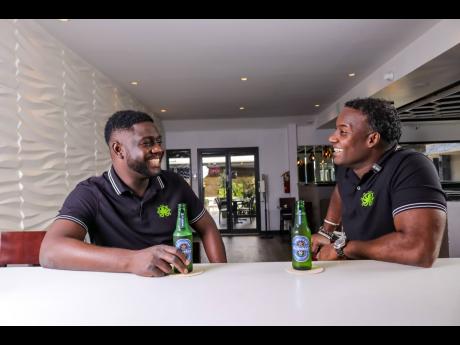Keeping tabs on teen drinkers - How bartenders are preventing underage partygoers from consuming alcohol
Whether you go out with friends occasionally or are described as a ‘party animal’, the COVID-19 pandemic has drastically changed the social scene in Jamaica. However, one thing that has not changed is the importance of consuming alcohol responsibly and reducing underage drinking and access. Programmes such as Red Stripe’s We-ID requires retailers to insist on photo identification before selling or serving alcohol products. Bartenders and mixologists also play a pivotal role as active gatekeepers. It’s a job Ryan Mitto and Taje Samuels, co-founders of WELLSKILL Entertainment, take seriously. They shared their experiences behind the bar and recommendation for fellow bartenders and mixologists.
How hard is it to guard against underage drinking?
Taje Samuels (TS): It’s sometimes easy to know when someone is underage based on the way they talk, dress and interact with their friends. But when the event is busy and things get very fast-paced, it is more difficult. An underage person can also ask someone else to buy the drink for them. So, I have to keep tabs and that can be difficult.
What are some stories that underage persons try to use to get alcohol?
Ryan Mitto (RM): You always have to be vigilant whenever you are serving alcohol, because people will try to tell you different things to get a drink. One story I hear often is that ‘It’s their birthday’, because whenever you’re at a restaurant or event, it’s the norm for bartenders to treat customers to a shot. You have to observe the customer carefully to ensure they’re above the legal drinking age. You also have to mark their faces, because they will sometimes use the same birthday story at several events to get free drinks. At the end of the day, you just have to protect them from themselves, and you have to protect yourself as well, because it could cost you more than your job — a possible prison sentence or a fine.
Do you face any resistance when you ask for ID?
RM: Some people do get offended, but you still have to stay in control of the situation and de-escalate it. You talk to them and let them know that it’s your job to make sure everyone at the bar or the party is safe, and that you don’t want them to leave and have something bad happen to them. That’s not something that I want on my conscience.
TS: As Ryan said, if you explain the situation to them, they will usually calm down, but you have the other 20 per cent that feel like they are above certain things. Like, if you come from a certain social class, it can take one phone call, and then the ‘boss’ will come and say give her whatever she wants. So, that is also a type of resistance that we have to deal with from time to time.
Do you think it would be easier if we had a national policy to show ID to purchase alcohol?
RM: Taje said it right when he said we need to get to an international standard. We have to make it a part of the culture of going out, that your ID is a crucial and necessary part of the drinking experience. In America, it’s like they just know that they have to have it no matter where they go. In America, you don’t even have to ask to see it, because in the line to get into the club, everybody has their ID in their hands, ready to show it. We should, and can, get to that place.
What advice would you give your colleagues on how to handle these challenges?
TS: Stand your ground, because you know you are on the right side of the issue. It will be difficult, and sometimes you might feel pressured to do something that you know is not the thing to do, but you have to always remember that you can affect somebody’s life drastically by giving them a drink, when you should not have. Always encourage people to drink responsibly.
RM: You are empowered to ensure the safety of the people that you serve. You should not be afraid to say no if you believe that someone has too much to drink or that someone is underage. You are the person that knows better, and sometimes you really do have to protect people from themselves. So, make sure that you uphold the drinking policies and do the things that you know are right.

